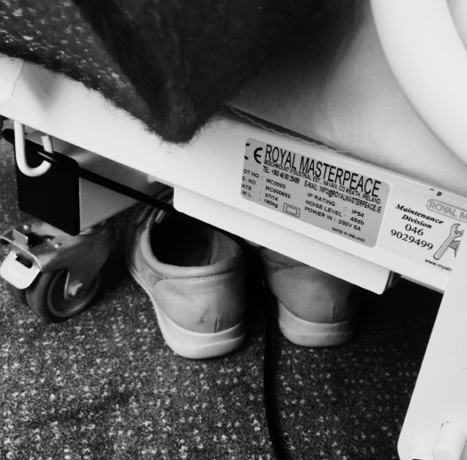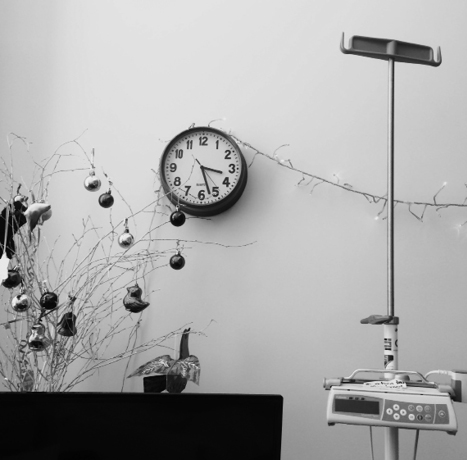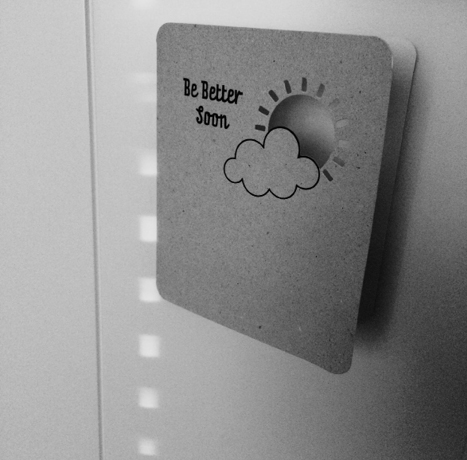Photographs by Cristín Leach
My granny got more Christmas cards than anyone I know. At the end of 2016, they crowded the surfaces of the nursing home room, clustered under the television, on the windowsill, the bedside locker. It was hot in there. Hot like a comfort blanket. The heat felt turgid and inert; a secure, immobilising heat. A heat to keep still in. A heat that would maintain body temperature without movement. There was no movement, except for the rise and fall of her chest. Her deep, long, open-mouthed breaths. The only, the last thing to do was to keep going; the last movement and the first: the taking of a breath.
I’ve thought a lot about the symmetry between the start and the end of life during the time it has taken my granny to go from being entirely independent and mobile to being here, a timespan of much less than a year. Both ends of life involve a letting go – of one state for another, from a known to an unknown. A step off the edge of a cliff. The body prepares for the start in one order, the end in reverse. We go from seeing little and cautious touching to an opening out into the world as we grow; we retreat like a tape rewinding, in the same ways but in reverse order, at the end. Seeing less, hearing less, moving less. Losing control of the muscles we once learned to use and direct in order to connect with the world, and which become so much taken for granted once we can use them that we forget them, all of them, as long as they work.
And the wonder, of life, and of everything new. We forget that, too.
My granny is ninety-four. She is sleeping. I don’t want to wake her. I feel like I would be doing it for me, not her, to let her know that I am here, that I was here. I am here to sit with her while she sleeps. I am in her presence, as she is in mine, sleeping and occasionally sighing. I don’t want to leave her here alone, even if she might not know I have been. I want no more an acknowledgement of my presence than I would from a sleeping baby. It is enough to be there, and more than enough, it is essential.
I don’t want to leave her, my vibrant granny. Widowed at fifty-nine, she’d drive down from Dublin to visit us in Kilkenny, a scarf in her hair or a scarf around her neck, a flare in her skirt, bare legs showing in summer beneath a well-hemmed edge, below the knee, finished by her own hand or sewing machine. I don’t want to leave her, but there’s an inertia here that cannot forever hold unless you succumb to its embrace. This is why the nurses talk loudly and cheerfully to each other. It’s why the bustle of vacuum cleaners, and the cups of tea, and the calls of hello and how-are-you fill the corridors and the rooms outside. All just to counter the pull of the heavy, hot stillness here.
You watch a person in a bed in a place like this the way you might watch a newborn baby – carefully, occasionally checking, trusting but never fully sure they will keep breathing. Granny has her soft blankets. The drip stand pushed into a corner, not attached, makes a strange still-life ensemble with the baubles on a glittery branch for a Christmas tree and the wall clock and a string of lights and the top of the television. The wall clock says it is twenty-nine minutes past three.
The last really good conversation I had with my granny was in her own house. She poured the tea and said, ‘Oh Cristín, when I think of the time that I’ve wasted.’ I told her no, but she said yes. I thought of all the people in the world who exist because she did: my three aunts, my uncle and my mum; their fourteen children, and their children, another fifteen people. How incredible – thirty-four people, all directly descended from this woman’s womb. A waste of time? What did she mean? Was it advice? Was it to me? Do not waste your time, Cristín, is that what she was saying? It is not enough to produce all these people, there must be something more? Is that what she meant?
My granny sent a card to every one of those thirty-four people every birthday, every Christmas, and at Easter, never forgetting one, adding grandchildren and great-grandchildren, as they came along, to a calendar on the wall. And she sent cards to many more: her sisters and brothers, nieces and nephews, cousins, uncles, aunts. And now they are all coming back to her. The room in which she sleeps is lined with them, for Christmas, for her November birthday.
She is ninety-four, sighing in the bed, and I do not want to wake her. I want her to sleep, like a baby, to be comfortable, to feel no pain, to feel and know instead that she is loved.
Granny had more poems in her head than she ever wrote down. We talked about it that day – the difficulty of capturing the words before they are gone, of setting them down and hammering them into shape before they disappear, before the moment passes. She had more dress designs in her head than she ever sewed up. But she did make clothes, and lamps, and Solitaire boards. She wrote poems, verses, ditties. She thought about words and she played with them. She did crosswords and Sudokus and listened to the radio and read the paper and stayed in the world in a way that many people who live as long as she did do not.
She embraced new means of communication with curiosity. I always got the best text messages from Granny. Her version of textspeak was super-abbreviated, sometimes to an extent that it required a cryptic-crossword mind to unravel what she meant –
U wr gr8 on tv. Lv u G.
She took up the iPad, she took up tins of paint, she took up carpentry tools, she took out her sewing machine, she extended skirts with panels of extra material, she took up sleeves, she wondered if a scarf could become a bolero jacket and she made it so. She found a plant she liked, she took a snippet or a seed and she planted it. She was full of creativity, and she shared it with us, passing on the things she had made, passing on clothes and cuttings of plants. Her gift was her ongoing presence in our lives.
It is December 28th, 2016 and I am here for her, but for myself, too. It’s a privilege to sit while she sleeps. A privilege, too, to have known her, to have been born into this family of descendants of Bridget Clarke and John McAdam. What a privilege to share this heritage of curious looking and inquisitive thinking, this love of words and colours and pattern and form, this questioning mind. Granny has lived her ninety-four years. I am here for her and I am here for myself –
To say goodbye, I love you and sleep tight.




